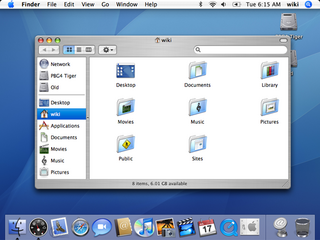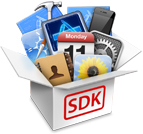
macOS, originally Mac OS X, previously shortened as OS X, is an operating system developed and marketed by Apple since 2001. It is the primary operating system for Apple's Mac computers. Within the market of desktop and laptop computers, it is the second most widely used desktop OS, after Microsoft Windows and ahead of all Linux distributions, including ChromeOS.

Mac OS X Server is a series of discontinued Unix-like server operating systems developed by Apple Inc. based on macOS. It provided server functionality and system administration tools, and tools to manage both macOS-based computers and iOS-based devices, network services such as a mail transfer agent, AFP and SMB servers, an LDAP server, and a domain name server, as well as server applications including a Web server, database, and calendar server.
Darwin is the core Unix operating system of macOS, iOS, watchOS, tvOS, iPadOS, visionOS, and bridgeOS. It previously existed as an independent open-source operating system, first released by Apple Inc. in 2000. It is composed of code derived from NeXTSTEP, FreeBSD, other BSD operating systems, Mach, and other free software projects' code, as well as code developed by Apple.
The history of macOS, Apple's current Mac operating system formerly named Mac OS X until 2011 and then OS X until 2016, began with the company's project to replace its "classic" Mac OS. That system, up to and including its final release Mac OS 9, was a direct descendant of the operating system Apple had used in its Mac computers since their introduction in 1984. However, the current macOS is a UNIX operating system built on technology that had been developed at NeXT from the 1980s until Apple purchased the company in early 1997.

OpenDoc is a defunct multi-platform software componentry framework standard created by Apple in the 1990s for compound documents, intended as an alternative to Microsoft's proprietary Object Linking and Embedding (OLE). It is one of Apple's earliest experiments with open standards and collaborative development methods with other companies. OpenDoc development was transferred to the non-profit Component Integration Laboratories, Inc., owned by a growing team of major corporate backers and effectively starting an industry consortium. In 1992, the AIM alliance was launched by Apple, IBM, and Motorola, with OpenDoc as a foundation. With the return of Steve Jobs to Apple, OpenDoc was discontinued in March 1997.
Yahoo Widgets is a discontinued free application platform for Mac OS X and Microsoft Windows, specifically Windows XP, Vista and Windows 7. The software was previously called Konfabulator, but after being acquired by computer services company Yahoo on July 25, 2005, it was rebranded. The name Konfabulator was subsequently reinstated as the name of the underlying rendering engine. The engine uses a JavaScript runtime environment combined with an XML interpreter to run small applications referred to as widgets, and hence is part of a class of software applications called widget engines. On February 27, 2012, Yahoo updated the License agreement stating that as of April 3, 2012 Yahoo! Widgets will continue to be available for download but support and development would stop.

Macintosh Programmer's Workshop (MPW) is a software development environment for the Classic Mac OS operating system, written by Apple Computer. For Macintosh developers, it was one of the primary tools for building applications for System 7.x and Mac OS 8.x and 9.x. Initially MPW was available for purchase as part of Apple's professional developers program, but Apple made it a free download after it was superseded by CodeWarrior. On Mac OS X it was replaced by the Project Builder IDE, which eventually became Xcode.

Mac OS X Tiger is the 5th major release of macOS, Apple's desktop and server operating system for Mac computers. Tiger was released to the public on April 29, 2005 for US$129.95 as the successor to Mac OS X 10.3 Panther. Included features were a fast searching system called Spotlight, a new version of the Safari web browser, Dashboard, a new 'Unified' theme, and improved support for 64-bit addressing on Power Mac G5s. Mac OS X 10.4 Tiger also had a number of additional features that Microsoft had spent several years struggling to add to Windows with acceptable performance, such as fast file searching and improved graphics processing.

Mac OS X Public Beta was the first publicly available version of Apple Computer's Mac OS X operating system to feature the Aqua user interface. It was released to the public on September 13, 2000 for US$29.95. Its release was significant as the first publicly available evidence of Apple's ability to ship the "next-generation Mac operating system" after the Copland failure. It allowed software developers and early adopters to test a preview of the upcoming operating system and develop software for it before its final release. It is the only public version of Mac OS X to have a code name not based on a big cat until the release of 10.9 Mavericks in 2013. The US version had a build number of 1H39 and the international version had build number 2E14.

BBEdit is a proprietary text editor made by Bare Bones Software, originally developed for Macintosh System Software 6, and currently supporting macOS.
This article provides basic comparisons for notable text editors. More feature details for text editors are available from the Category of text editor features and from the individual products' articles. This article may not be up-to-date or necessarily all-inclusive.
The following tables compare general and technical information for a number of office suites:
The Apple Developer Tools are a suite of software tools from Apple to aid in making software dynamic titles for the macOS and iOS platforms. The developer tools were formerly included on macOS install media, but are now exclusively distributed over the Internet. As of macOS 10.12, Xcode is available as a free download from the Mac App Store.

The iOS SDK, formerly the iPhone SDK, is a software development kit (SDK) developed by Apple Inc. The kit allows for the development of mobile apps on Apple's iOS and iPadOS operating systems.

OS X Mavericks is the 10th major release of macOS, Apple Inc.'s desktop and server operating system for Macintosh computers. OS X Mavericks was announced on June 10, 2013, at WWDC 2013, and was released on October 22, 2013, worldwide.








